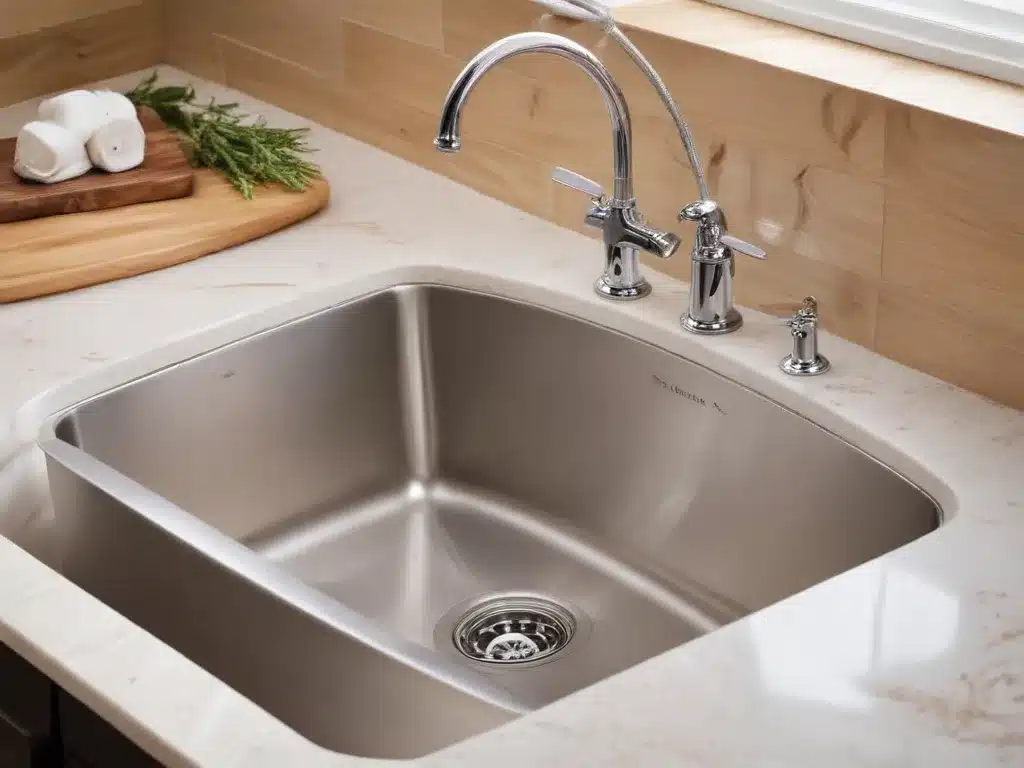Introduction: Embracing a Greener Approach to Cleaning
In today’s world, where environmental concerns are paramount, it’s crucial to adopt eco-friendly practices in every aspect of our lives, including household cleaning. One area that often gets overlooked is sink maintenance. Traditional cleaners may leave sinks sparkling, but at what cost to our health and the environment? As a conscientious individual, I’ve embarked on a journey to uncover effective and safe alternatives to toxic chemicals, ensuring that my sinks shine without compromising my well-being or the planet’s.
The Hidden Dangers of Conventional Sink Cleaners
Sink cleaners – these common household products often contain a cocktail of hazardous ingredients. Abrasives like oxalic acid and hydrochloric acid can cause skin irritation and respiratory issues. Ammonia, a potent eye and respiratory irritant, is another culprit. Phosphates, found in many cleaners, contribute to algal blooms and pollute waterways. As I delved deeper into the risks associated with these chemicals, I realized the urgent need for change.
Natural Alternatives: Safe and Effective Solutions
Fortunately, nature provides us with an abundance of safe and effective alternatives for cleaning sinks. Here are some of my go-to ingredients:
-
Baking Soda: This gentle abrasive is a powerhouse for tackling stubborn stains and grime in sinks. Its mild alkalinity helps cut through grease and gunk, leaving surfaces clean and fresh.
-
Vinegar: White vinegar is a natural disinfectant and deodorizer. Its acidic nature makes it an excellent choice for removing hard water stains and mineral buildup from sinks.
-
Lemon Juice: Packed with citric acid, lemon juice is a versatile cleaning agent that can brighten and deodorize sinks. Its fresh, invigorating scent is an added bonus.
-
Salt: Combining salt with baking soda or vinegar creates a gentle yet effective scouring paste that can tackle even the toughest sink stains.
-
Essential Oils: A few drops of essential oils like lemon, tea tree, or eucalyptus can not only add a pleasant aroma but also provide antibacterial and antifungal properties.
DIY Sink Cleaning Recipes
Armed with these natural ingredients, I’ve experimented with various DIY recipes to find the perfect solutions for shining sinks without toxic chemicals. Here are a few of my favorites:
All-Purpose Sink Cleaner
| Ingredients | Quantity |
|---|---|
| Baking Soda | 1 cup |
| Vinegar | 1/2 cup |
| Lemon Juice | 1/4 cup |
- Mix the baking soda, vinegar, and lemon juice in a bowl, stirring until a thick paste forms.
- Apply the paste to the sink, focusing on heavily soiled areas.
- Let it sit for 5-10 minutes to allow the ingredients to work their magic.
- Scrub the sink using a non-abrasive sponge or cloth.
- Rinse thoroughly with water, and voilà! A sparkling clean sink without harsh chemicals.
Stainless Steel Sink Polisher
| Ingredients | Quantity |
|---|---|
| Olive Oil | 1/4 cup |
| Vinegar | 1/4 cup |
- Mix the olive oil and vinegar in a bowl, creating a smooth emulsion.
- Apply the mixture to the stainless steel sink using a soft cloth or paper towel.
- Buff the surface in circular motions until it shines like new.
- Rinse with water and dry with a clean cloth or paper towel.
This recipe not only cleans but also helps protect the sink’s surface, leaving it with a lustrous finish.
Sustainable Practices: Beyond Sink Cleaning
While exploring eco-friendly sink cleaning solutions, I’ve also adopted other sustainable practices in my household. Here are a few examples:
- Reusable Cleaning Cloths: Ditching paper towels in favor of reusable microfiber cloths reduces waste and saves money in the long run.
- Composting: Collecting food scraps and yard waste for composting not only reduces landfill waste but also provides nutrient-rich soil for gardening.
- Energy-Efficient Appliances: Investing in energy-efficient appliances, such as dishwashers and washing machines, can significantly reduce your carbon footprint and save on utility bills.
- Water Conservation: Simple habits like turning off the faucet while brushing teeth or taking shorter showers can go a long way in conserving precious water resources.
Real-Life Success Stories
Embracing natural cleaning methods has been a rewarding journey, and I’m not alone in this endeavor. Many individuals and organizations have shared their inspiring stories of transitioning to eco-friendly practices:
-
Jane Smith, a mother of two, shared how switching to vinegar and baking soda for sink cleaning has not only saved her money but also improved her family’s overall health by eliminating exposure to harsh chemicals.
-
The Green Cleaning Initiative, a local non-profit organization, has been advocating for safer cleaning products and practices in schools and public spaces, promoting a healthier environment for our communities.
-
Eco-Friendly Cleaning Co., a pioneering company, has developed a line of plant-based cleaning products that are both effective and environmentally responsible, proving that sustainability and cleanliness can go hand in hand.
Conclusion: A Brighter, Greener Future
By embracing natural and non-toxic alternatives for sink cleaning, I’ve not only achieved sparkling results but also contributed to a healthier home and a cleaner planet. The journey towards sustainability may seem daunting at first, but every small step counts. Whether it’s switching to DIY cleaning solutions or adopting other eco-friendly practices, together we can make a significant impact. Let’s shine our sinks and our world with a greener mindset, leaving a legacy of a cleaner and healthier environment for future generations.







